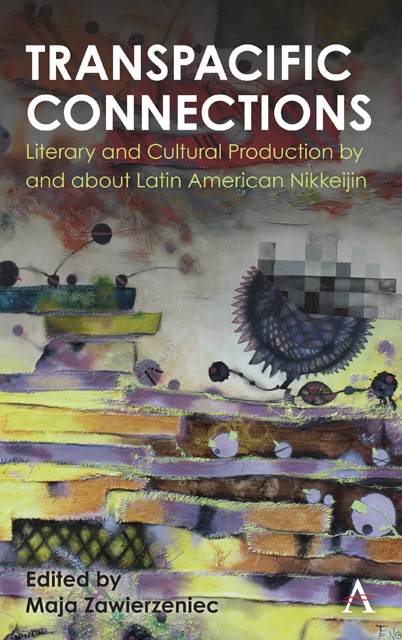Book contents
- Frontmatter
- Contents
- Notes on Contributors
- Introduction
- Chapter 1 The “Japanese Community” in Brazil and its Literary Production: The Functioning of “Death” in Matsui Tarô’s Literary Fiction
- Chapter 2 Contested Modernities: Representations of the Brazilian Dekasegi and the Nipponization of Brazil in Nikkei Cultural Production
- Chapter 3 When Gustave Flaubert Meets Ryūnosuke Akutagawa: “Corazón Sencillo” by Augusto Higa Oshiro. The Short Story of a Peruvian Nikkei Writer
- Chapter 4 Japanese Prints in Tablada’s Writings: Cultural and Media Transposition in ‘El poema de Okusai’
- Chapter 5 The Telenovela Oyuki’s Sin (El Pecado De Oyuki): Las Realidades Del Otro or Mexico through A Japanized Lens
- Index
Chapter 1 - The “Japanese Community” in Brazil and its Literary Production: The Functioning of “Death” in Matsui Tarô’s Literary Fiction
Published online by Cambridge University Press: 09 December 2022
- Frontmatter
- Contents
- Notes on Contributors
- Introduction
- Chapter 1 The “Japanese Community” in Brazil and its Literary Production: The Functioning of “Death” in Matsui Tarô’s Literary Fiction
- Chapter 2 Contested Modernities: Representations of the Brazilian Dekasegi and the Nipponization of Brazil in Nikkei Cultural Production
- Chapter 3 When Gustave Flaubert Meets Ryūnosuke Akutagawa: “Corazón Sencillo” by Augusto Higa Oshiro. The Short Story of a Peruvian Nikkei Writer
- Chapter 4 Japanese Prints in Tablada’s Writings: Cultural and Media Transposition in ‘El poema de Okusai’
- Chapter 5 The Telenovela Oyuki’s Sin (El Pecado De Oyuki): Las Realidades Del Otro or Mexico through A Japanized Lens
- Index
Summary
Introduction
Matsui Tarô (松井太郎), born in 1917 in Kobe, Japan, migrated to Brazil in 1936. He was just one of the around one hundred and eighty thousand pre–Second World War Japanese migrants to Brazil that Ishikawa Tatsuzô has compared in his novel Sôbô [The People] to “fallen leaves”: “green,” when still living in Japan, these leaves (=migrants) “withered,” when life in Japan “became unbearable” for them. The Kobe Emigration Center was, in Ishikawa Tatsuzô's words, a place where the “wind gathered these fallen leaves” that would perhaps “gain new life” once in Brazil. Paul Salopek describes the moment in which life “becomes unbearable” for a future migrant as follows: “How strong is the push to leave? To abandon what you love? To walk into the unknown with all your possessions stuffed into a pocket? It is more powerful than fear of death.” What was the “push to leave” for the 180,000 Japanese nationals that immigrated to Brazil in the first half of the twentieth century? In one of his historical short stories, Matsui Tarô (1917–2017) describes the situation in Japan at that time, mentioning that a “peaceful reign” was “something to be thankful for,” but the “worldwide recession and the cold-weather damage in the northeast” had contributed to people's difficult living conditions. He goes on explaining that “too many people” were living on the small territory of Japan and that those who left for abroad were commonly (and in an antipathetic manner) referred to as “superfluous persons [余計もの].”
“Worldwide recession,” “insufficient land,” and “surplus population,” as well as “escaping from conscription” and the Japanese Land Tax Reform of 1873, leading to the confiscation of many farmers’ land due to their inability to pay the new taxes, are the commonly mentioned reasons for prewar Japanese migration to Brazil, both in academic literature and by the Japanese immigrants and their descendants that I had a chance to talk to during my two-year academic sojourn in São Paulo.
In Imin yonjû-nen shi [History of forty years of [Japanese] immigration [to Brazil]], the first extensive history book about the Japanese migration to Brazil, written collectively by the migrants themselves, these are precisely the reasons given in order to explain the motivation behind Japanese prewar mass migrations to Brazil.
- Type
- Chapter
- Information
- Transpacific ConnectionsLiterary and Cultural Production by and about Latin American Nikkeijin, pp. 9 - 32Publisher: Anthem PressPrint publication year: 2022



